2024届高三下学期英语二轮复习:七选五讲解 课件(共27张PPT)
文档属性
| 名称 | 2024届高三下学期英语二轮复习:七选五讲解 课件(共27张PPT) |  | |
| 格式 | pptx | ||
| 文件大小 | 1.6MB | ||
| 资源类型 | 教案 | ||
| 版本资源 | 通用版 | ||
| 科目 | 英语 | ||
| 更新时间 | 2024-04-03 09:50:07 | ||
图片预览

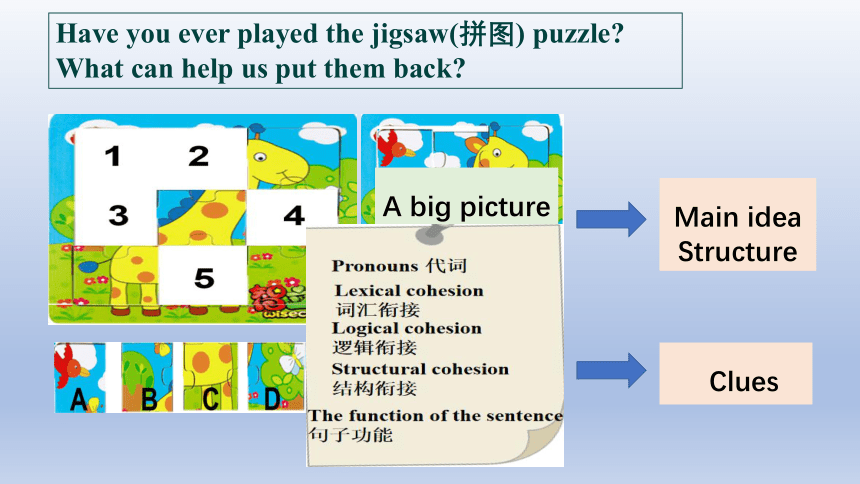

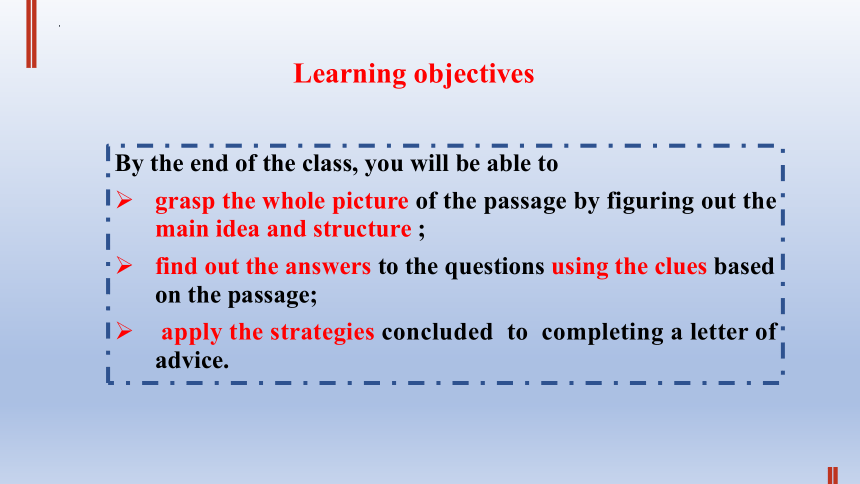
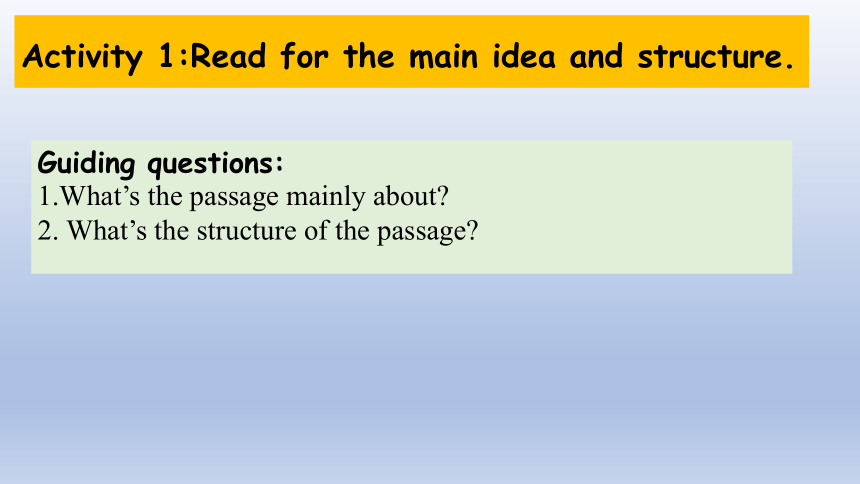
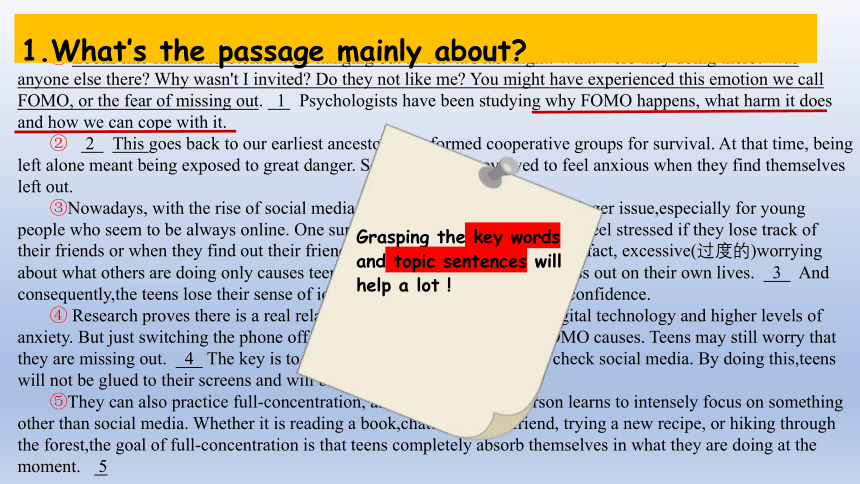

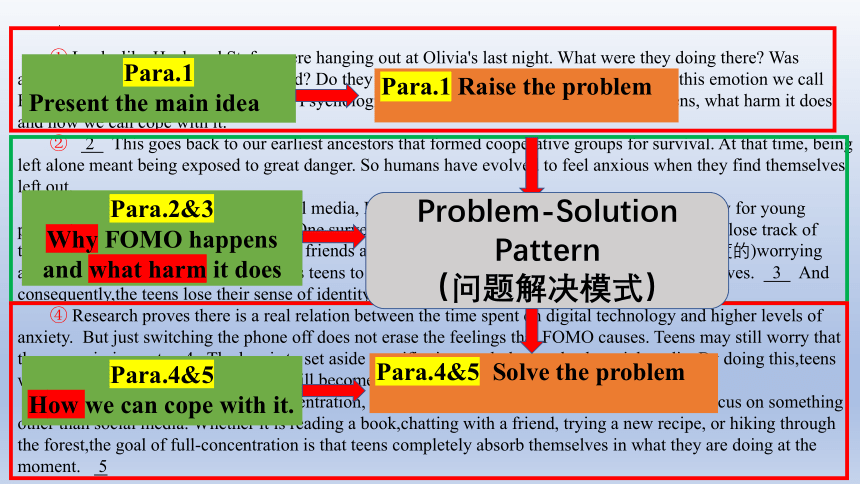
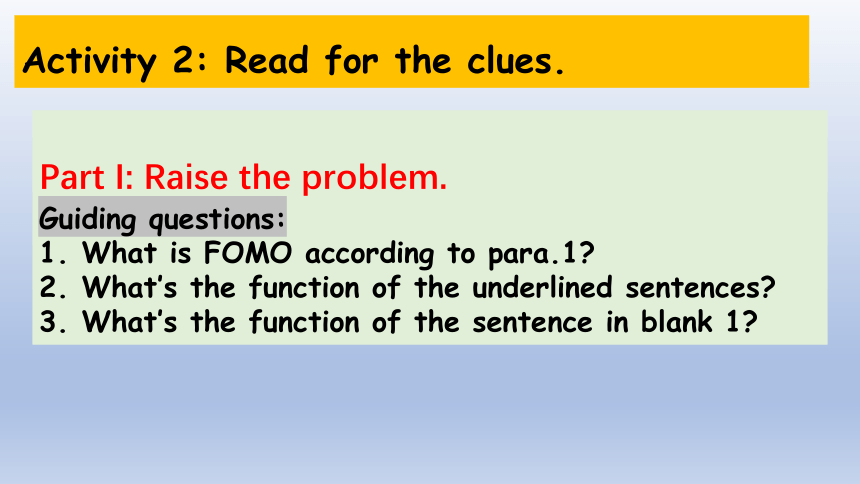
文档简介
(共27张PPT)
Big Pictures
Small Clues
Easy Gap-filling
Have you ever played the jigsaw(拼图) puzzle
What can help us put them back
shape
colour
Clues
A big picture
Main idea
Structure
How to deal with the gap-filling task quickly and accurately
G
A
P
rasp the whole picture;
nalyse the clues and apply the strategies;
iece the information together and practice more!
Learning objectives
By the end of the class, you will be able to
grasp the whole picture of the passage by figuring out the main idea and structure ;
find out the answers to the questions using the clues based on the passage;
apply the strategies concluded to completing a letter of advice.
Activity 1:Read for the main idea and structure.
Guiding questions:
1.What’s the passage mainly about
2. What’s the structure of the passage
① Looks like Hank and Stefan were hanging out at Olivia's last night. What were they doing there Was anyone else there Why wasn't I invited Do they not like me You might have experienced this emotion we call FOMO, or the fear of missing out. 1 Psychologists have been studying why FOMO happens, what harm it does and how we can cope with it.
② 2 This goes back to our earliest ancestors that formed cooperative groups for survival. At that time, being left alone meant being exposed to great danger. So humans have evolved to feel anxious when they find themselves left out.
③Nowadays, with the rise of social media, FOMO has become an even bigger issue,especially for young people who seem to be always online. One survey has found that 60% of teens feel stressed if they lose track of their friends or when they find out their friends are having fun without them.In fact, excessive(过度的)worrying about what others are doing only causes teens to admire others blindly and miss out on their own lives. 3 And consequently,the teens lose their sense of identity and struggle with low self-confidence.
④ Research proves there is a real relation between the time spent on digital technology and higher levels of anxiety. But just switching the phone off does not erase the feelings that FOMO causes. Teens may still worry that they are missing out. 4 The key is to set aside specific time each day to check social media. By doing this,teens will not be glued to their screens and will become more productive.
⑤They can also practice full-concentration, an exercise where a person learns to intensely focus on something other than social media. Whether it is reading a book,chatting with a friend, trying a new recipe, or hiking through the forest,the goal of full-concentration is that teens completely absorb themselves in what they are doing at the moment. 5
1.What’s the passage mainly about
Grasping the key words
and topic sentences will help a lot !
① Looks like Hank and Stefan were hanging out at Olivia's last night. What were they doing there Was anyone else there Why wasn't I invited Do they not like me You might have experienced this emotion we call FOMO, or the fear of missing out. 1 Psychologists have been studying why FOMO happens, what harm it does and how we can cope with it.
② 2 This goes back to our earliest ancestors that formed cooperative groups for survival. At that time, being left alone meant being exposed to great danger. So humans have evolved to feel anxious when they find themselves left out.
③Nowadays, with the rise of social media, FOMO has become an even bigger issue,especially for young people who seem to be always online. One survey has found that 60% of teens feel stressed if they lose track of their friends or when they find out their friends are having fun without them.In fact, excessive(过度的)worrying about what others are doing only causes teens to admire others blindly and miss out on their own lives. 3 And consequently,the teens lose their sense of identity and struggle with low self-confidence.
④ Research proves there is a real relation between the time spent on digital technology and higher levels of anxiety. But just switching the phone off does not erase the feelings that FOMO causes. Teens may still worry that they are missing out. 4 The key is to set aside specific time each day to check social media. By doing this,teens will not be glued to their screens and will become more productive.
⑤They can also practice full-concentration, an exercise where a person learns to intensely focus on something other than social media. Whether it is reading a book,chatting with a friend, trying a new recipe, or hiking through the forest,the goal of full-concentration is that teens completely absorb themselves in what they are doing at the moment. 5
Para.1
Para.2&3Why FOMO happens and what harm it does
Para.4&5 How we can cope with it
Problem!!!
① Looks like Hank and Stefan were hanging out at Olivia's last night. What were they doing there Was anyone else there Why wasn't I invited Do they not like me You might have experienced this emotion we call FOMO, or the fear of missing out. 1 Psychologists have been studying why FOMO happens, what harm it does and how we can cope with it.
② 2 This goes back to our earliest ancestors that formed cooperative groups for survival. At that time, being left alone meant being exposed to great danger. So humans have evolved to feel anxious when they find themselves left out.
③Nowadays, with the rise of social media, FOMO has become an even bigger issue,especially for young people who seem to be always online. One survey has found that 60% of teens feel stressed if they lose track of their friends or when they find out their friends are having fun without them.In fact, excessive(过度的)worrying about what others are doing only causes teens to admire others blindly and miss out on their own lives. 3 And consequently,the teens lose their sense of identity and struggle with low self-confidence.
④ Research proves there is a real relation between the time spent on digital technology and higher levels of anxiety. But just switching the phone off does not erase the feelings that FOMO causes. Teens may still worry that they are missing out. 4 The key is to set aside specific time each day to check social media. By doing this,teens will not be glued to their screens and will become more productive.
⑤They can also practice full-concentration, an exercise where a person learns to intensely focus on something other than social media. Whether it is reading a book,chatting with a friend, trying a new recipe, or hiking through the forest,the goal of full-concentration is that teens completely absorb themselves in what they are doing at the moment. 5
Para.1 Raise the problem
Para.2&3Analyse the problem
Para.4&5 Solve the problem
Para.2&3
Why FOMO happens and what harm it does
Para.4&5
How we can cope with it.
Para.1
Present the main idea
Problem-Solution Pattern
(问题解决模式)
Activity 2: Read for the clues.
1.
Part I: Raise the problem.
Guiding questions:
1. What is FOMO according to para.1
2. What’s the function of the underlined sentences
3. What’s the function of the sentence in blank 1
Looks like Hank and Stefan were hanging out at Olivia's last night. What were they doing there Was anyone else there Why wasn't I invited Do they not like me You might have experienced this emotion we call FOMO, or the fear of missing out. 1____ Psychologists have been studying why FOMO happens, what harm it does and how we can cope with it.
1. What is FOMO according to para.1
2. What’s the function of the underlined sentences
an emotional problem
To raise the topic/ problem.
同/近义词复现 words of similar meanings
① Looks like Hank and Stefan were hanging out at Olivia's last night. What were they doing there Was anyone else there Why wasn't I invited Do they not like me You might have experienced this emotion we call FOMO, or the fear of missing out. 1 Psychologists have been studying why FOMO happens, what harm it does and how we can cope with it.
A. Human beings are historically a social species.
B. That anxiety you feel can be awful, but not so hopeless.
C. In this way there will be no room in their brains for FOMO.
D. Generally, people with low social ranks tend to suffer from FOMO.
E. That is, FOMO keeps their attention focused outward instead of inward.
F. One practical approach to handling FOMO is to schedule technology breaks.
G. Encourage teens to recognize what they see online may not actually be the case.
3. What’s the function of the sentence in blank 1
It acts as a transitional sentence(过渡句).
Check your analysis and choose the right answer.
1. Pay attention to the “position ” of the sentence.
2. The relationship bewteen the sentences is important!
Activity 2:Read for clues.
1.
Part II: Analyse the problem.
Guiding questions:
1. What’s the relationship between para.2&3
2. Which key word do you think might be included in the sentence(Blank 2)
3. What does the underlined word “this” in para.2 refer to
② 2 This goes back to our earliest ancestors that formed cooperative groups for survival. At that time, being left alone meant being exposed to great danger. So humans have evolved (进化,发展)to feel anxious when they find themselves left out.
③ Nowadays, with the rise of social media, FOMO has become an even bigger issue, especially for young people who seem to be always online. One survey has found that 60% of teens feel stressed if they lose track of their friends or when they find out their friends are having fun without them. In fact, excessive(过度的)worrying about what others are doing only causes teens to admire others blindly and miss out on their own lives. 3 And consequently, the teens lose their sense of identity and struggle with low self-confidence.
1. What’s the relationship between para.2&3
2. Which key word do you think might be included in blank2
Successive relation(承接关系)
Successive relation(承接关系)
Transition relation(转折关系)
Parallel relationship(并列关系)
Cause and effect relationship(因果关系)
② 2 This goes back to our earliest ancestors that formed cooperative groups for survival. At that time, being left alone meant being exposed to great danger. So humans have evolved (进化,发展)to feel anxious when they find themselves left out.
③ Nowadays, with the rise of social media, FOMO has become an even bigger issue,especially for young people who seem to be always online. One survey has found that 60% of teens feel stressed if they lose track of their friends or when they find out their friends are having fun without them. In fact, excessive(过度的)worrying about what others are doing only causes teens to admire others blindly and miss out on their own lives. 3 And consequently,the teens lose their sense of identity and struggle with low self-confidence.
3. What does the underlined word “this” in para.2 refer to
A. Human beings are historically a social species.
B. That anxiety you feel can be awful, but not so hopeless.
C. In this way there will be no room in their brains for FOMO.
D. Generally, people with low social ranks tend to suffer from FOMO.
E. That is, FOMO keeps their attention focused outward instead of inward.
F. One practical approach to handling FOMO is to schedule technology breaks.
G. Encourage teens to recognize what they see online may not actually be the case.
synonyms(同义词)
Activity 2:Read for clues.
1.
Part II: Analyse the problem.
1. What harm does FOMO cause to the teenagers
2. Find out the clues and choose the best option for blank 3.
C. In this way there will be no room in their brains for FOMO.
D. Generally, people with low social ranks tend to suffer from FOMO.
E. That is, FOMO keeps their attention focused outward instead of inward.
F. One practical approach to handling FOMO is to schedule technology breaks.
G. Encourage teens to recognize what they see online may not actually be the case.
③Nowadays, with the rise of social media, FOMO has become an even bigger issue,especially for young people who seem to be always online. One survey has found that 60% of teens feel stressed if they lose track of their friends or when they find out their friends are having fun without them. In fact, excessive(过度的)worrying about what others are doing only causes teens to admire others blindly and miss out on their own lives. 3 And consequently, the teens lose their sense of identity and struggle with low self-confidence.
C. In this way there will be no room in their brains for FOMO.
D. Generally, people with low social ranks tend to suffer from FOMO.
E. That is, FOMO keeps their attention focused outward instead of inward.
F. One practical approach to handling FOMO is to schedule technology breaks.
G. Encourage teens to recognize what they see online may not actually be the case.
1.What harm does FOMO cause to the teenagers
2.Find out the clues and choose the best option for blank 3.
Cause and Effect 因果
To give explanation
Activity 2:Read for clues.
1.
Part III: Solve the problem.
Requiremnets: Have a discussion with your partners and then share your answers.
Guiding questions:
1. What’s the solution to dealing with FOMO according to Para.5
2. What does the underlined word “also” imply
3. Find out the clues and choose the best options for blank 4&5.
C. In this way there will be no room in their brains for FOMO.
D. Generally, people with low social ranks tend to suffer from FOMO.
F. One practical approach to handling FOMO is to schedule technology breaks.
G. Encourage teens to recognize what they see online may not actually be the case.
④ Research proves there is a real relation between the time spent on digital technology and higher levels of anxiety. But just switching the phone off does not erase the feelings that FOMO causes. Teens may still worry that they are missing out. 4 The key is to set aside specific time each day to check social media. By doing this, teens will not be glued to their screens and will become more productive.
⑤They can also practice full-concentration, an exercise where a person learns to intensely focus on something other than social media. Whether it is reading a book,chatting with a friend, trying a new recipe, or hiking through the forest,the goal of full-concentration is that teens completely absorb themselves in what they are doing at the moment. 5
C. In this way there will be no room in their brains for FOMO.
D. Generally, people with low social ranks tend to suffer from FOMO.
F. One practical approach to handling FOMO is to schedule technology breaks.
G. Encourage teens to recognize what they see online may not actually be the case.
1. What’s the solution to dealing with FOMO according to Para.5
2. What does the underlined word “also” imply
One practical approach to handling FOMO is to schedule technology breaks. The key is to set aside specific time each day to check social media. By doing this, teens will not be glued to their screens and will become more productive. They can also practice full-concentration, an exercise where a person learns to intensely focus on something other than social media. Whether it is reading a book, chatting with a friend, trying a new recipe, or hiking through the forest, the goal of full-concentration is that teens completely absorb themselves in what they are doing at the moment. In this way there will be no room in their brains for FOMO.
Solutions
Read the two paragraphs aloud and pay attention to the links!
Dear Mike,
Knowing that you are suffering from FOMO, I feel sorry. However,
1. ________________________________. And here is some advice for you.
First of all, 2._____________________________________________. That is to say, you only use the phone at certain times every day. In this way, you will not be glued to the screen and will become more efficient.
Besides, absorb yourself in what you are doing at the moment. 3.________________________________________________________________.
Sincerely hope you find my suggestions useful.
Yours,
Li Hua
Activity 3: Finish a letter of advice.
Activity 3: Finish a letter of advice.
1.
Requirements:
1.Grasp the main idea and structure of the passage.
2. Circle the clues using the strategies you have acquired.
3. Pay attention to your handwriting.
Activity 4: Exchange opinions with your partners.
1.
Requirements:
1.Exchange your opinions on the main idea and structure of the passage.
2.Discuss how you get the answers
and polish them.
3.Be active and critical.
Activity 5: Show yourself
1.
Requirements for the presenters:
1.Be able to clearly present the main idea and structure.
2.Be able to briefly but accurately share how you get the answers.
3.Be loud and proud!
Requirements for the listeners:
1.Be attentive.
2.Be able to make objective comments.
3.Be generous with your opinions and applause!
One possible version
Knowing that you are suffering from FOMO, I feel sorry. However, 1.____________________________. And here is some advice for you.
First of all, 2._____________________________________________. That is to say, you only use the phone at certain times every day. In this way, you will not be glued to the screen and will become more efficient.
Besides, absorb yourself in what you are doing at the moment. 3.__________________________________________________________
Sincerely hope you find my suggestions useful.
Yours,
Li Hua
FOMO can be coped with
set aside specific time each day to check social media.
By doing this, there will be no room in your brain for FOMO.
Get absorbed in the present ;
Abandon electronic devices at specific time;
Pursue a fulfilling life!
Grasp the whole picture;
Analyse the clues and apply the strategies;
Piece the information together and practice more.
Inspiration
from passage 1
Notes for reference
Advice from me
Give sincere advice ;
Assist others in time;
Provide support to people in need!
Get fully prepared!
Appreciate the present to the fullest!
Pursue the future with all your strength!
All the gaps can be filled!
★Assignments:
1. Organize the notes on what you have learned today.
2. Design your own Gap-filling for the given passage.
Big Pictures
Small Clues
Easy Gap-filling
Have you ever played the jigsaw(拼图) puzzle
What can help us put them back
shape
colour
Clues
A big picture
Main idea
Structure
How to deal with the gap-filling task quickly and accurately
G
A
P
rasp the whole picture;
nalyse the clues and apply the strategies;
iece the information together and practice more!
Learning objectives
By the end of the class, you will be able to
grasp the whole picture of the passage by figuring out the main idea and structure ;
find out the answers to the questions using the clues based on the passage;
apply the strategies concluded to completing a letter of advice.
Activity 1:Read for the main idea and structure.
Guiding questions:
1.What’s the passage mainly about
2. What’s the structure of the passage
① Looks like Hank and Stefan were hanging out at Olivia's last night. What were they doing there Was anyone else there Why wasn't I invited Do they not like me You might have experienced this emotion we call FOMO, or the fear of missing out. 1 Psychologists have been studying why FOMO happens, what harm it does and how we can cope with it.
② 2 This goes back to our earliest ancestors that formed cooperative groups for survival. At that time, being left alone meant being exposed to great danger. So humans have evolved to feel anxious when they find themselves left out.
③Nowadays, with the rise of social media, FOMO has become an even bigger issue,especially for young people who seem to be always online. One survey has found that 60% of teens feel stressed if they lose track of their friends or when they find out their friends are having fun without them.In fact, excessive(过度的)worrying about what others are doing only causes teens to admire others blindly and miss out on their own lives. 3 And consequently,the teens lose their sense of identity and struggle with low self-confidence.
④ Research proves there is a real relation between the time spent on digital technology and higher levels of anxiety. But just switching the phone off does not erase the feelings that FOMO causes. Teens may still worry that they are missing out. 4 The key is to set aside specific time each day to check social media. By doing this,teens will not be glued to their screens and will become more productive.
⑤They can also practice full-concentration, an exercise where a person learns to intensely focus on something other than social media. Whether it is reading a book,chatting with a friend, trying a new recipe, or hiking through the forest,the goal of full-concentration is that teens completely absorb themselves in what they are doing at the moment. 5
1.What’s the passage mainly about
Grasping the key words
and topic sentences will help a lot !
① Looks like Hank and Stefan were hanging out at Olivia's last night. What were they doing there Was anyone else there Why wasn't I invited Do they not like me You might have experienced this emotion we call FOMO, or the fear of missing out. 1 Psychologists have been studying why FOMO happens, what harm it does and how we can cope with it.
② 2 This goes back to our earliest ancestors that formed cooperative groups for survival. At that time, being left alone meant being exposed to great danger. So humans have evolved to feel anxious when they find themselves left out.
③Nowadays, with the rise of social media, FOMO has become an even bigger issue,especially for young people who seem to be always online. One survey has found that 60% of teens feel stressed if they lose track of their friends or when they find out their friends are having fun without them.In fact, excessive(过度的)worrying about what others are doing only causes teens to admire others blindly and miss out on their own lives. 3 And consequently,the teens lose their sense of identity and struggle with low self-confidence.
④ Research proves there is a real relation between the time spent on digital technology and higher levels of anxiety. But just switching the phone off does not erase the feelings that FOMO causes. Teens may still worry that they are missing out. 4 The key is to set aside specific time each day to check social media. By doing this,teens will not be glued to their screens and will become more productive.
⑤They can also practice full-concentration, an exercise where a person learns to intensely focus on something other than social media. Whether it is reading a book,chatting with a friend, trying a new recipe, or hiking through the forest,the goal of full-concentration is that teens completely absorb themselves in what they are doing at the moment. 5
Para.1
Para.2&3Why FOMO happens and what harm it does
Para.4&5 How we can cope with it
Problem!!!
① Looks like Hank and Stefan were hanging out at Olivia's last night. What were they doing there Was anyone else there Why wasn't I invited Do they not like me You might have experienced this emotion we call FOMO, or the fear of missing out. 1 Psychologists have been studying why FOMO happens, what harm it does and how we can cope with it.
② 2 This goes back to our earliest ancestors that formed cooperative groups for survival. At that time, being left alone meant being exposed to great danger. So humans have evolved to feel anxious when they find themselves left out.
③Nowadays, with the rise of social media, FOMO has become an even bigger issue,especially for young people who seem to be always online. One survey has found that 60% of teens feel stressed if they lose track of their friends or when they find out their friends are having fun without them.In fact, excessive(过度的)worrying about what others are doing only causes teens to admire others blindly and miss out on their own lives. 3 And consequently,the teens lose their sense of identity and struggle with low self-confidence.
④ Research proves there is a real relation between the time spent on digital technology and higher levels of anxiety. But just switching the phone off does not erase the feelings that FOMO causes. Teens may still worry that they are missing out. 4 The key is to set aside specific time each day to check social media. By doing this,teens will not be glued to their screens and will become more productive.
⑤They can also practice full-concentration, an exercise where a person learns to intensely focus on something other than social media. Whether it is reading a book,chatting with a friend, trying a new recipe, or hiking through the forest,the goal of full-concentration is that teens completely absorb themselves in what they are doing at the moment. 5
Para.1 Raise the problem
Para.2&3Analyse the problem
Para.4&5 Solve the problem
Para.2&3
Why FOMO happens and what harm it does
Para.4&5
How we can cope with it.
Para.1
Present the main idea
Problem-Solution Pattern
(问题解决模式)
Activity 2: Read for the clues.
1.
Part I: Raise the problem.
Guiding questions:
1. What is FOMO according to para.1
2. What’s the function of the underlined sentences
3. What’s the function of the sentence in blank 1
Looks like Hank and Stefan were hanging out at Olivia's last night. What were they doing there Was anyone else there Why wasn't I invited Do they not like me You might have experienced this emotion we call FOMO, or the fear of missing out. 1____ Psychologists have been studying why FOMO happens, what harm it does and how we can cope with it.
1. What is FOMO according to para.1
2. What’s the function of the underlined sentences
an emotional problem
To raise the topic/ problem.
同/近义词复现 words of similar meanings
① Looks like Hank and Stefan were hanging out at Olivia's last night. What were they doing there Was anyone else there Why wasn't I invited Do they not like me You might have experienced this emotion we call FOMO, or the fear of missing out. 1 Psychologists have been studying why FOMO happens, what harm it does and how we can cope with it.
A. Human beings are historically a social species.
B. That anxiety you feel can be awful, but not so hopeless.
C. In this way there will be no room in their brains for FOMO.
D. Generally, people with low social ranks tend to suffer from FOMO.
E. That is, FOMO keeps their attention focused outward instead of inward.
F. One practical approach to handling FOMO is to schedule technology breaks.
G. Encourage teens to recognize what they see online may not actually be the case.
3. What’s the function of the sentence in blank 1
It acts as a transitional sentence(过渡句).
Check your analysis and choose the right answer.
1. Pay attention to the “position ” of the sentence.
2. The relationship bewteen the sentences is important!
Activity 2:Read for clues.
1.
Part II: Analyse the problem.
Guiding questions:
1. What’s the relationship between para.2&3
2. Which key word do you think might be included in the sentence(Blank 2)
3. What does the underlined word “this” in para.2 refer to
② 2 This goes back to our earliest ancestors that formed cooperative groups for survival. At that time, being left alone meant being exposed to great danger. So humans have evolved (进化,发展)to feel anxious when they find themselves left out.
③ Nowadays, with the rise of social media, FOMO has become an even bigger issue, especially for young people who seem to be always online. One survey has found that 60% of teens feel stressed if they lose track of their friends or when they find out their friends are having fun without them. In fact, excessive(过度的)worrying about what others are doing only causes teens to admire others blindly and miss out on their own lives. 3 And consequently, the teens lose their sense of identity and struggle with low self-confidence.
1. What’s the relationship between para.2&3
2. Which key word do you think might be included in blank2
Successive relation(承接关系)
Successive relation(承接关系)
Transition relation(转折关系)
Parallel relationship(并列关系)
Cause and effect relationship(因果关系)
② 2 This goes back to our earliest ancestors that formed cooperative groups for survival. At that time, being left alone meant being exposed to great danger. So humans have evolved (进化,发展)to feel anxious when they find themselves left out.
③ Nowadays, with the rise of social media, FOMO has become an even bigger issue,especially for young people who seem to be always online. One survey has found that 60% of teens feel stressed if they lose track of their friends or when they find out their friends are having fun without them. In fact, excessive(过度的)worrying about what others are doing only causes teens to admire others blindly and miss out on their own lives. 3 And consequently,the teens lose their sense of identity and struggle with low self-confidence.
3. What does the underlined word “this” in para.2 refer to
A. Human beings are historically a social species.
B. That anxiety you feel can be awful, but not so hopeless.
C. In this way there will be no room in their brains for FOMO.
D. Generally, people with low social ranks tend to suffer from FOMO.
E. That is, FOMO keeps their attention focused outward instead of inward.
F. One practical approach to handling FOMO is to schedule technology breaks.
G. Encourage teens to recognize what they see online may not actually be the case.
synonyms(同义词)
Activity 2:Read for clues.
1.
Part II: Analyse the problem.
1. What harm does FOMO cause to the teenagers
2. Find out the clues and choose the best option for blank 3.
C. In this way there will be no room in their brains for FOMO.
D. Generally, people with low social ranks tend to suffer from FOMO.
E. That is, FOMO keeps their attention focused outward instead of inward.
F. One practical approach to handling FOMO is to schedule technology breaks.
G. Encourage teens to recognize what they see online may not actually be the case.
③Nowadays, with the rise of social media, FOMO has become an even bigger issue,especially for young people who seem to be always online. One survey has found that 60% of teens feel stressed if they lose track of their friends or when they find out their friends are having fun without them. In fact, excessive(过度的)worrying about what others are doing only causes teens to admire others blindly and miss out on their own lives. 3 And consequently, the teens lose their sense of identity and struggle with low self-confidence.
C. In this way there will be no room in their brains for FOMO.
D. Generally, people with low social ranks tend to suffer from FOMO.
E. That is, FOMO keeps their attention focused outward instead of inward.
F. One practical approach to handling FOMO is to schedule technology breaks.
G. Encourage teens to recognize what they see online may not actually be the case.
1.What harm does FOMO cause to the teenagers
2.Find out the clues and choose the best option for blank 3.
Cause and Effect 因果
To give explanation
Activity 2:Read for clues.
1.
Part III: Solve the problem.
Requiremnets: Have a discussion with your partners and then share your answers.
Guiding questions:
1. What’s the solution to dealing with FOMO according to Para.5
2. What does the underlined word “also” imply
3. Find out the clues and choose the best options for blank 4&5.
C. In this way there will be no room in their brains for FOMO.
D. Generally, people with low social ranks tend to suffer from FOMO.
F. One practical approach to handling FOMO is to schedule technology breaks.
G. Encourage teens to recognize what they see online may not actually be the case.
④ Research proves there is a real relation between the time spent on digital technology and higher levels of anxiety. But just switching the phone off does not erase the feelings that FOMO causes. Teens may still worry that they are missing out. 4 The key is to set aside specific time each day to check social media. By doing this, teens will not be glued to their screens and will become more productive.
⑤They can also practice full-concentration, an exercise where a person learns to intensely focus on something other than social media. Whether it is reading a book,chatting with a friend, trying a new recipe, or hiking through the forest,the goal of full-concentration is that teens completely absorb themselves in what they are doing at the moment. 5
C. In this way there will be no room in their brains for FOMO.
D. Generally, people with low social ranks tend to suffer from FOMO.
F. One practical approach to handling FOMO is to schedule technology breaks.
G. Encourage teens to recognize what they see online may not actually be the case.
1. What’s the solution to dealing with FOMO according to Para.5
2. What does the underlined word “also” imply
One practical approach to handling FOMO is to schedule technology breaks. The key is to set aside specific time each day to check social media. By doing this, teens will not be glued to their screens and will become more productive. They can also practice full-concentration, an exercise where a person learns to intensely focus on something other than social media. Whether it is reading a book, chatting with a friend, trying a new recipe, or hiking through the forest, the goal of full-concentration is that teens completely absorb themselves in what they are doing at the moment. In this way there will be no room in their brains for FOMO.
Solutions
Read the two paragraphs aloud and pay attention to the links!
Dear Mike,
Knowing that you are suffering from FOMO, I feel sorry. However,
1. ________________________________. And here is some advice for you.
First of all, 2._____________________________________________. That is to say, you only use the phone at certain times every day. In this way, you will not be glued to the screen and will become more efficient.
Besides, absorb yourself in what you are doing at the moment. 3.________________________________________________________________.
Sincerely hope you find my suggestions useful.
Yours,
Li Hua
Activity 3: Finish a letter of advice.
Activity 3: Finish a letter of advice.
1.
Requirements:
1.Grasp the main idea and structure of the passage.
2. Circle the clues using the strategies you have acquired.
3. Pay attention to your handwriting.
Activity 4: Exchange opinions with your partners.
1.
Requirements:
1.Exchange your opinions on the main idea and structure of the passage.
2.Discuss how you get the answers
and polish them.
3.Be active and critical.
Activity 5: Show yourself
1.
Requirements for the presenters:
1.Be able to clearly present the main idea and structure.
2.Be able to briefly but accurately share how you get the answers.
3.Be loud and proud!
Requirements for the listeners:
1.Be attentive.
2.Be able to make objective comments.
3.Be generous with your opinions and applause!
One possible version
Knowing that you are suffering from FOMO, I feel sorry. However, 1.____________________________. And here is some advice for you.
First of all, 2._____________________________________________. That is to say, you only use the phone at certain times every day. In this way, you will not be glued to the screen and will become more efficient.
Besides, absorb yourself in what you are doing at the moment. 3.__________________________________________________________
Sincerely hope you find my suggestions useful.
Yours,
Li Hua
FOMO can be coped with
set aside specific time each day to check social media.
By doing this, there will be no room in your brain for FOMO.
Get absorbed in the present ;
Abandon electronic devices at specific time;
Pursue a fulfilling life!
Grasp the whole picture;
Analyse the clues and apply the strategies;
Piece the information together and practice more.
Inspiration
from passage 1
Notes for reference
Advice from me
Give sincere advice ;
Assist others in time;
Provide support to people in need!
Get fully prepared!
Appreciate the present to the fullest!
Pursue the future with all your strength!
All the gaps can be filled!
★Assignments:
1. Organize the notes on what you have learned today.
2. Design your own Gap-filling for the given passage.
